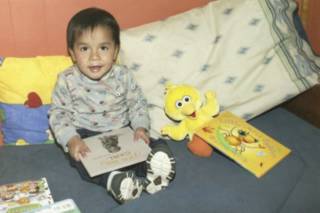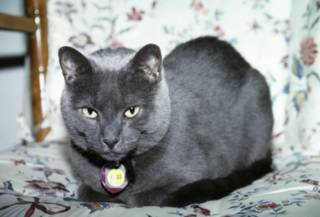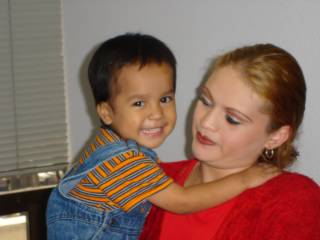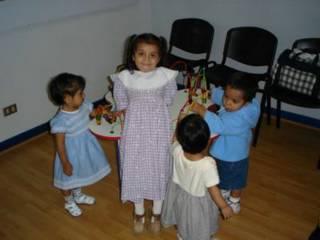We have a cat, Jumpin' Jack Flash, who thinks he is a dog - or maybe a toddler - or maybe a toddler-aged dog. He made me late for work this morning (not really... I work flex-time) because he stuck his head in a small watering can that was full, got stuck, and dumped the entire thing over onto the carpet.
We're having work done on our chimney and at the moment, there is a dropcloth hanging across the now-open fireplace. There is soot in the fireplace so I find Flash's black pawprints on our white windowsills and off-white kitchen floor.
Flash lets us know when visitors come to our door. He meows and comes to find us, urging us to see who has come to see us. Could it be someone who has nifty-smelling feet? (that seems to be what he's most interested in with visitors - I suppose it's better than the type of sniffing that dogs do to greet people)
When Flash doesn't get enough attention (which is almost always) he partakes of activities that he knows he is not allowed to do, just to get attention (attention is good whether it's attention for good or bad things.) Our clothes closets are magnet-ed shut because Flash slides the doors open and crawls around inside, sometimes up our clothes. The front hallway closet is available to him, so he often pushes on those doors so they make noise and then he tromps around inside on whatever noisy objects he can find.
Flash likes to drink from any receptacle except for his water dish. After our showers in the morning, he licks the remaining water off of the tub. If we leave the toilet lid open, he'll drink from the toilet. We pick our battles; we close the toilet and let him have free reign of the shower.
A few years ago when we lived in an apartment, Flash would get up on top of the bedroom door. He did this once while we were away for the weekend. As the door swung shut, he jumped off, pushing the door closed and latched. He was stuck in our bedroom for 3 days. Note: his food and litter box were NOT kept in our bedroom.
Early in our cat parenting, we asked the veterinarian how to discipline him. He was scratching the wood off the doors, pulling up the carpet, etc. One of the vet's suggestions was "time out" in a separate room because he was doing a lot of his antics for attention. We put him in the bathroom as it was the only room besides our bedroom (which would've been much too fun for him) that had a door on it. He meowed for awhile and then took to knocking everything off of the vanity and edge of the tub and scratching at the shower curtain (they aren't as effective with holes in them.) We then tried to put him in timeout inside his carrier in the bathroom. Aha! We shut down his means to wrecking anything and assumed we were shutting down his deviant behavior in the meantime. Yeah, right - no matter whether we left him in there for 5 seconds, 5 minutes, or 20 minutes, he came tearing out ready to rumble again, craving even more attention after his stint in the deprivation tank.
When we adopted Flash from the pound, he was about 4 months old - still a kitten, but not tiny. We would watch him play and investigate his new surroundings with great parental pride and love. After a week of this, we realized that we were only paying attention to the cat and not to each other. All of our focus and attention was on Flash. While cute and worthy of such attention, he really didn't deserve all of our attention to the detriment of our human relationship. So, we planned a "date night" to pull ourselves away from the cat. This is not unlike how new parents have to schedule (and probably re-schedule a few times) time alone with their spouses away from the child(ren).
We've learned a lot about parenting from our "forever in toddler stage" cat. He tries our patience, makes us late for work, requires daily interaction, and snuggles with us on the couch.
Before you think I expect parenting a person to be like parenting a cat, never fear - I'm not comparing Flash and his needs directly to a child and his/her needs. I'm comparing some of our feelings and behaviors toward Flash to some of the feelings and behaviors we'll have toward our children.




















